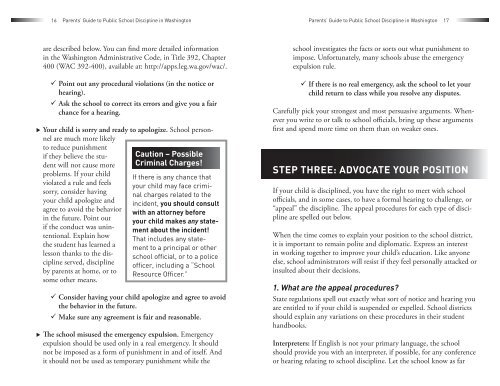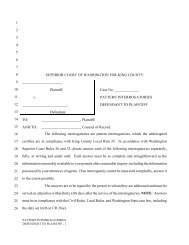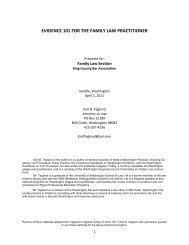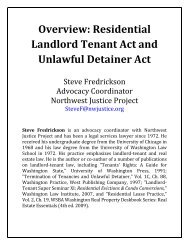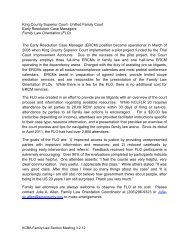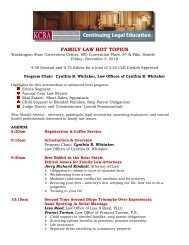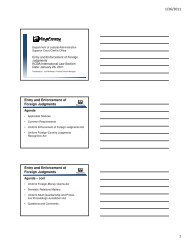parents' guide to public school discipline in washington - ACLU of ...
parents' guide to public school discipline in washington - ACLU of ...
parents' guide to public school discipline in washington - ACLU of ...
Create successful ePaper yourself
Turn your PDF publications into a flip-book with our unique Google optimized e-Paper software.
16 Parents’ Guide <strong>to</strong> Public School Discipl<strong>in</strong>e <strong>in</strong> Wash<strong>in</strong>g<strong>to</strong>n Parents’ Guide <strong>to</strong> Public School Discipl<strong>in</strong>e <strong>in</strong> Wash<strong>in</strong>g<strong>to</strong>n 17are described below. You can f<strong>in</strong>d more detailed <strong>in</strong>formation<strong>in</strong> the Wash<strong>in</strong>g<strong>to</strong>n Adm<strong>in</strong>istrative Code, <strong>in</strong> Title 392, Chapter400 (WAC 392-400), available at: http://apps.leg.wa.gov/wac/. Po<strong>in</strong>t out any procedural violations (<strong>in</strong> the notice orhear<strong>in</strong>g). Ask the <strong>school</strong> <strong>to</strong> correct its errors and give you a fairchance for a hear<strong>in</strong>g.Your child is sorry and ready <strong>to</strong> apologize. School personnelare much more likely<strong>to</strong> reduce punishmentif they believe the studentwill not cause moreproblems. If your childviolated a rule and feelssorry, consider hav<strong>in</strong>gyour child apologize andagree <strong>to</strong> avoid the behavior<strong>in</strong> the future. Po<strong>in</strong>t outif the conduct was un<strong>in</strong>tentional.Expla<strong>in</strong> howthe student has learned alesson thanks <strong>to</strong> the <strong>discipl<strong>in</strong>e</strong>served, <strong>discipl<strong>in</strong>e</strong>by parents at home, or <strong>to</strong>some other means.Caution – PossibleCrim<strong>in</strong>al Charges!If there is any chance thatyour child may face crim<strong>in</strong>alcharges related <strong>to</strong> the<strong>in</strong>cident, you should consultwith an at<strong>to</strong>rney beforeyour child makes any statementabout the <strong>in</strong>cident!That <strong>in</strong>cludes any statement<strong>to</strong> a pr<strong>in</strong>cipal or other<strong>school</strong> <strong>of</strong>ficial, or <strong>to</strong> a police<strong>of</strong>ficer, <strong>in</strong>clud<strong>in</strong>g a “SchoolResource Officer.” Consider hav<strong>in</strong>g your child apologize and agree <strong>to</strong> avoidthe behavior <strong>in</strong> the future. Make sure any agreement is fair and reasonable.The <strong>school</strong> misused the emergency expulsion. Emergencyexpulsion should be used only <strong>in</strong> a real emergency. It shouldnot be imposed as a form <strong>of</strong> punishment <strong>in</strong> and <strong>of</strong> itself. Andit should not be used as temporary punishment while the<strong>school</strong> <strong>in</strong>vestigates the facts or sorts out what punishment <strong>to</strong>impose. Unfortunately, many <strong>school</strong>s abuse the emergencyexpulsion rule.If there is no real emergency, ask the <strong>school</strong> <strong>to</strong> let yourchild return <strong>to</strong> class while you resolve any disputes.Carefully pick your strongest and most persuasive arguments. Wheneveryou write <strong>to</strong> or talk <strong>to</strong> <strong>school</strong> <strong>of</strong>ficials, br<strong>in</strong>g up these argumentsfirst and spend more time on them than on weaker ones.STEP THREE: ADVOCATE YOUR POSITIONIf your child is <strong>discipl<strong>in</strong>e</strong>d, you have the right <strong>to</strong> meet with <strong>school</strong><strong>of</strong>ficials, and <strong>in</strong> some cases, <strong>to</strong> have a formal hear<strong>in</strong>g <strong>to</strong> challenge, or“appeal” the <strong>discipl<strong>in</strong>e</strong>. The appeal procedures for each type <strong>of</strong> <strong>discipl<strong>in</strong>e</strong>are spelled out below.When the time comes <strong>to</strong> expla<strong>in</strong> your position <strong>to</strong> the <strong>school</strong> district,it is important <strong>to</strong> rema<strong>in</strong> polite and diplomatic. Express an <strong>in</strong>terest<strong>in</strong> work<strong>in</strong>g <strong>to</strong>gether <strong>to</strong> improve your child’s education. Like anyoneelse, <strong>school</strong> adm<strong>in</strong>istra<strong>to</strong>rs will resist if they feel personally attacked or<strong>in</strong>sulted about their decisions.1. What are the appeal procedures?State regulations spell out exactly what sort <strong>of</strong> notice and hear<strong>in</strong>g youare entitled <strong>to</strong> if your child is suspended or expelled. School districtsshould expla<strong>in</strong> any variations on these procedures <strong>in</strong> their studenthandbooks.Interpreters: If English is not your primary language, the <strong>school</strong>should provide you with an <strong>in</strong>terpreter, if possible, for any conferenceor hear<strong>in</strong>g relat<strong>in</strong>g <strong>to</strong> <strong>school</strong> <strong>discipl<strong>in</strong>e</strong>. Let the <strong>school</strong> know as far


